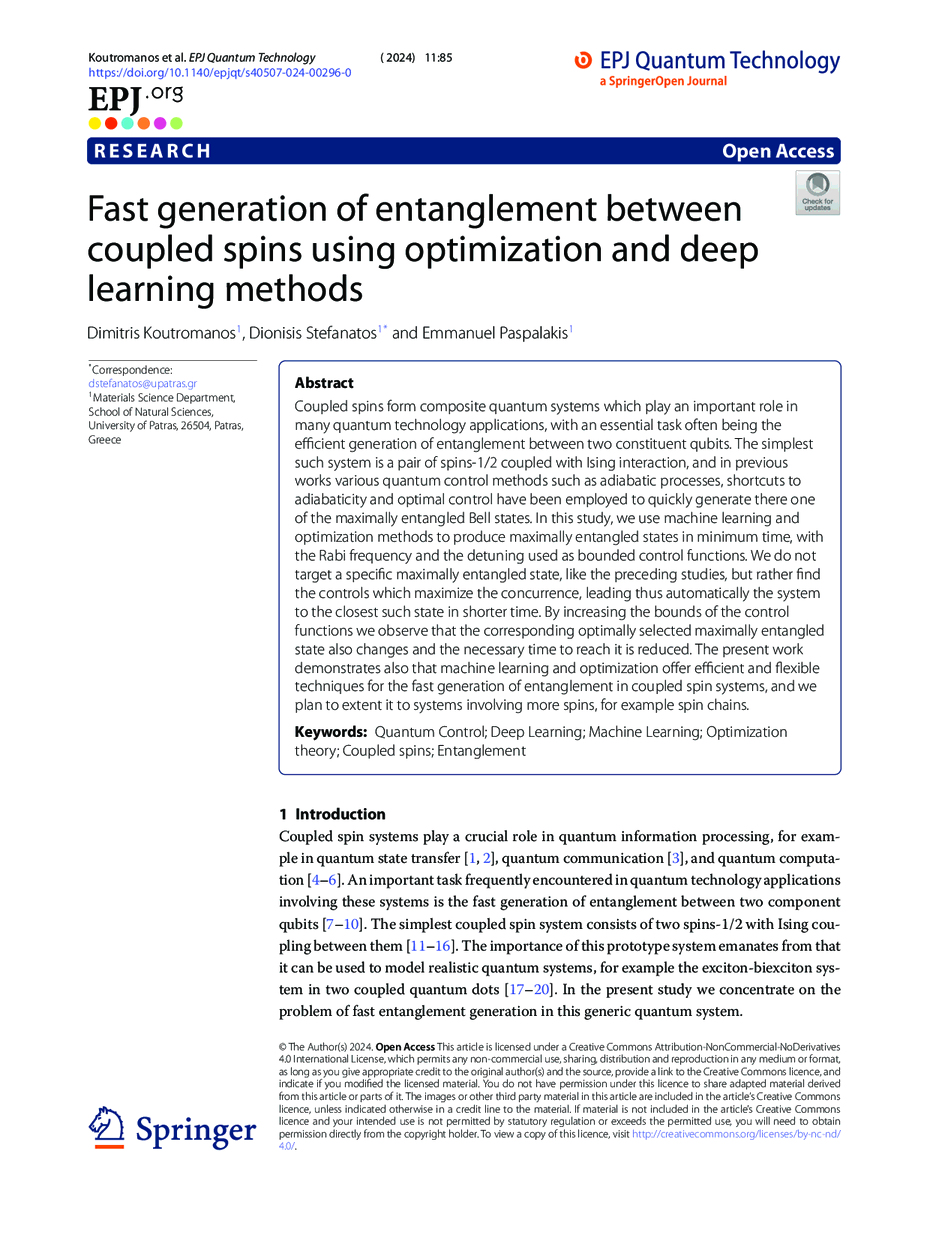https://doi.org/10.1140/epjqt/s40507-024-00296-0
Research
Fast generation of entanglement between coupled spins using optimization and deep learning methods
Materials Science Department, School of Natural Sciences, University of Patras, 26504, Patras, Greece
Received:
25
September
2024
Accepted:
3
December
2024
Published online:
18
December
2024
Coupled spins form composite quantum systems which play an important role in many quantum technology applications, with an essential task often being the efficient generation of entanglement between two constituent qubits. The simplest such system is a pair of spins- coupled with Ising interaction, and in previous works various quantum control methods such as adiabatic processes, shortcuts to adiabaticity and optimal control have been employed to quickly generate there one of the maximally entangled Bell states. In this study, we use machine learning and optimization methods to produce maximally entangled states in minimum time, with the Rabi frequency and the detuning used as bounded control functions. We do not target a specific maximally entangled state, like the preceding studies, but rather find the controls which maximize the concurrence, leading thus automatically the system to the closest such state in shorter time. By increasing the bounds of the control functions we observe that the corresponding optimally selected maximally entangled state also changes and the necessary time to reach it is reduced. The present work demonstrates also that machine learning and optimization offer efficient and flexible techniques for the fast generation of entanglement in coupled spin systems, and we plan to extent it to systems involving more spins, for example spin chains.
coupled with Ising interaction, and in previous works various quantum control methods such as adiabatic processes, shortcuts to adiabaticity and optimal control have been employed to quickly generate there one of the maximally entangled Bell states. In this study, we use machine learning and optimization methods to produce maximally entangled states in minimum time, with the Rabi frequency and the detuning used as bounded control functions. We do not target a specific maximally entangled state, like the preceding studies, but rather find the controls which maximize the concurrence, leading thus automatically the system to the closest such state in shorter time. By increasing the bounds of the control functions we observe that the corresponding optimally selected maximally entangled state also changes and the necessary time to reach it is reduced. The present work demonstrates also that machine learning and optimization offer efficient and flexible techniques for the fast generation of entanglement in coupled spin systems, and we plan to extent it to systems involving more spins, for example spin chains.
Key words: Quantum Control / Deep Learning / Machine Learning / Optimization theory / Coupled spins / Entanglement
© The Author(s) 2024
 Open Access This article is licensed under a Creative Commons Attribution-NonCommercial-NoDerivatives 4.0 International License, which permits any non-commercial use, sharing, distribution and reproduction in any medium or format, as long as you give appropriate credit to the original author(s) and the source, provide a link to the Creative Commons licence, and indicate if you modified the licensed material. You do not have permission under this licence to share adapted material derived from this article or parts of it. The images or other third party material in this article are included in the article’s Creative Commons licence, unless indicated otherwise in a credit line to the material. If material is not included in the article’s Creative Commons licence and your intended use is not permitted by statutory regulation or exceeds the permitted use, you will need to obtain permission directly from the copyright holder. To view a copy of this licence, visit http://creativecommons.org/licenses/by-nc-nd/4.0/.
Open Access This article is licensed under a Creative Commons Attribution-NonCommercial-NoDerivatives 4.0 International License, which permits any non-commercial use, sharing, distribution and reproduction in any medium or format, as long as you give appropriate credit to the original author(s) and the source, provide a link to the Creative Commons licence, and indicate if you modified the licensed material. You do not have permission under this licence to share adapted material derived from this article or parts of it. The images or other third party material in this article are included in the article’s Creative Commons licence, unless indicated otherwise in a credit line to the material. If material is not included in the article’s Creative Commons licence and your intended use is not permitted by statutory regulation or exceeds the permitted use, you will need to obtain permission directly from the copyright holder. To view a copy of this licence, visit http://creativecommons.org/licenses/by-nc-nd/4.0/.





